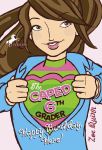A Girl's Guide to the Superhero Life
 NON-COMICS WEEK (and a day) at Oz and Ends comes to a close with a look at a superhero genre novel aimed at girls. Zoe Quinn's Caped 6th Grader series starts with Happy Birthday, Hero! I've already discussed two types of anachronisms in this book, but today I'm comparing this book's approach to the superhero life with that in similar novels about boys, such as William Boniface's The Hero Revealed.
NON-COMICS WEEK (and a day) at Oz and Ends comes to a close with a look at a superhero genre novel aimed at girls. Zoe Quinn's Caped 6th Grader series starts with Happy Birthday, Hero! I've already discussed two types of anachronisms in this book, but today I'm comparing this book's approach to the superhero life with that in similar novels about boys, such as William Boniface's The Hero Revealed.
Both books take place in a world of full of superheroes, with families passing down extraordinary powers. Kids collect comic books and other artifacts about grown-up heroes. (The Hero Revealed explores the marketing of such artifacts while Happy Birthday, Hero! has more fun at the mall: among the earring stores its protagonist visits are the Piercing Post, Hoop De-Doo's, Pierce-sonal Preference, The Stud Farm, and Lobe-and-Be-Holed.)
Both books have big, energetic illustrations, and Happy Birthday, Hero! also uses big type for sound effects, as in comics. I can't tell whether readers are meant to see a reference to straightening the Tower of Pisa as an allusion to Superman III, but clearly its readers are supposed to know the traditions of superhero comics.
When it comes to superheroing, Happy Birthday, Hero! puts a lot more emphasis on secrecy than The Hero Revealed. After Zoe hears that she's developing superpowers, she doesn't immediately try them out. (Think of "Will" in the critically lambasted Dark Is Rising movie, asking "Merriman" if he'll now be able to fly; a lot of fans of the book have criticized that moment in previews, but it's exactly what an American boy would do.)
Instead, Zoe wonders, "Is everything going to have to change?" The big drama for her is the secrecy of swearing to follow the superhero code, particularly keeping the secret from her mother. Overall, her view of superheroing emphasizes the emotional side:But as far as I was concerned, the thing that made her [Lightning Girl] truly heroic was the fact that she never pretended she wasn't scared.
I don't think that concern shows up in any of the boy-superhero books.
In fact, while I criticized The Hero Revealed for putting only one token female on its superhero teams, I found Happy Birthday, Hero! to be even more colored by gender stereotypes. And by "colored," let me start by pointing out this is the pinkest book I've read in a long time. Beyond that:
And here's the moment that shows how superpowers can be so embarrassing:Feeling brave, I decided to try one of the cute gestures Emily's magazines were always recommending: I tilted my chin and gave my hair a little toss.
By the end of the book, Zoe hasn't gone far in her superhero career; this is just the first in a series, and it's slim. But she has discovered that other girls made unauthorized alterations to a costume for a school play. Oh, the villainy!
Unfortunately, it turned out to be a superpowered turbo hair toss, and the sweeping motion of my flowing locks created a gust of wind that toppled the prop table.
Maybe those details sprang out at me more forcefully because I'm a former boy rather than a former girl, or because they stand out in the superhero genre, which has traditionally been dominated by a masculine sensibility. But I think this is probably an example of mass-market fiction playing off society's dominant attitudes rather than daring to challenge them.


3 comments:
John, have you read Martine Leavitt's "Heck Superhero"? I haven't yet, but thought it looked intriguing.
No, I haven't, but it does look intriguing (and serious, which is no doubt one reason I haven't read it).
Like Barry Lyga's Fanboy novels, this is a third area where comics and literary fiction are intertwining: stories about comics readers, in which following the adventures of superheroes is not just a childish hobby but a source of inspiration and identity.
It does look serious, but based on her other work, I'm guessing it's got a light touch.
Post a Comment